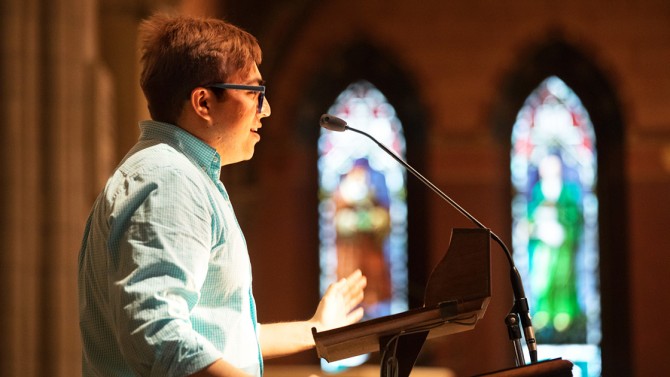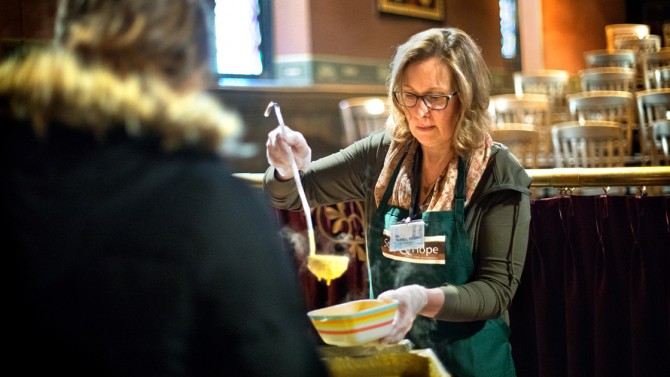Soup & Hope speaker uses love of languages to push for social change
By Nancy Doolittle
For José Armando Fernandez Guerrero ’18, two strong women – his grandmother, Apolonia, and his mother, Josefina – believed that his education would open opportunities. A third – a high school French teacher – showed him how to use his education, and the passion for languages and linguistics it inspired, to help him embrace and move beyond his past.
José’s grandmother grew up in a rural village in central Mexico, with no birth certificate or schooling. She spoke Spanish and Otomí, an indigenous language unrelated to any European language, and she could not spell her own name. “But what she did have was a vision. And she had guts,” said José, recounting his family’s background at the Soup & Hope event March 1 in Sage Chapel.
When Josefina was 13, Apolonia took her and her two sisters to the border city of Tijuana so they could receive an education. They moved into a small wooden house with one light bulb, powered through an extension cord that ran to the neighbor’s house. Josefina cleaned houses in the morning and went to high school evening classes. She later studied medicine and worked for a doctor who eventually became her husband.
Years later, wanting her own children to have opportunities, Josefina enrolled José and his sister in high school in San Diego, California. They received student visas, and Josefina spent six hours each day driving them to and from school.
José felt out of place at the U.S. high school: He had a strong Mexican accent and could not stay for any after-school activities. “There was only one place where I escaped having a Spanish accent: my high school French class,” he said. “Everyone had an accent there, so it did not matter.”
His French teacher had come from France, so she understood how isolating having an accent in a foreign country can be. She helped José speak better French and English, and he soon learned other European languages. His passion for linguistics opened the door to his acceptance at Cornell.
But José resisted the idea of learning Otomí. To him, Otomí was a thing of the past and symbolized poverty, isolationism and intolerance, whereas European languages symbolized progressiveness.
During the gap year that José took before coming to Cornell, he went to São Paulo, Brazil. Friends there seemed more interested in his experiences in Mexico and his exposure to Otomí than in his education in the U.S., and José realized his resistance to learning Otomí and his preference for European languages might be misplaced.
“The further I went into linguistics,” he said, “the more I could bring together both my desire to keep on learning about languages and my hope to make amends with my background.”
José now looks forward to pursuing a doctorate in linguistics, believing that social change can come from working with languages. Over winter break, he began to create a dictionary of Ch’ol, a Mayan language spoken by about 200,000 people in southern Mexico. The dictionary gives José hope, because it documents and preserves the language, and connects those who speak it with other, more widespread languages, opening doors to education.
“It gives me hope that I am putting in effort to help someone receive an education,” he said. “It gives me hope that they won’t be forced to emigrate from their towns, cities or even countries just to find a decent job. It gives me hope that they can spell their own name.”
The next Soup & Hope talk will be March 15 at noon in Sage Chapel, with speaker Grace Cuang ’18. Majoring in chemical engineering and passionate about photography and film, she will recount her story of self-discovery.
Media Contact
Get Cornell news delivered right to your inbox.
Subscribe
